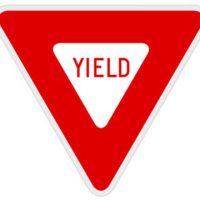Failure to Yield Accidents

When driving on Texas’ roadways, you have to be aware of the traffic laws in place as well as any signs or signals. When you come to an intersection or merge onto a road or freeway, there are right of way laws that apply. If you don’t follow the laws, you may be cited or even involved in an accident.
Under Texas Transportation Code TRANSP § 545.153, right of way at an intersection may be indicated by a stop sign or yield sign. A driver approaching an intersection on a roadway controlled by a stop sign must first stop and then yield the right-of-way to a vehicle that has entered the intersection from another highway.
A driver approaching an intersection on a roadway controlled by a yield sign must do the following:
- Slow to a speed that is reasonable under the existing conditions.
- Yield the right-of-way to a vehicle in the intersection or approaching on another highway.
If a motorist is required to yield and is involved in a collision with a vehicle in an intersection after driving past a yield sign without stopping, the collision is considered to be evidence that the motorist failed to yield the right of way.
How Do These Crashes Occur?
A failure to yield accident occurs when a driver fails to yield the road and causes a crash with a vehicle that does have the right of way. These accidents happen in situations such as the following:
- There is a flashing yellow or red light.
- A driver fails to yield the right of way to a pedestrian in a crosswalk.
- A driver making a left turn fails to yield to oncoming traffic.
- A driver is aggressive about merging onto the highway.
- A driver is entering the street from a private driveway.
Typically, the person who fails to yield is the one who gets injured, although this is not always the case. The extent of a failure to yield crash will vary depending on vehicle size and how the vehicle was hit.
Failure to yield may be the actual and proximate cause of a crash. Actual cause means that the plaintiff’s injury would not have occurred had the defendant not acted the way they did. Proximate cause means that the plaintiff’s injury was directly caused by the defendant’s act. it is an action that produced foreseeable consequences without anyone else causing it.
Contact a Personal Injury Lawyer
As a driver, you have to remember that there will always be other vehicles on the roadway. Do not act as though you have the right of way at all times.
If you are involved in a failure to yield accident, contact a Houston car accident attorney from The West Law Office, PLLC. Our goal is to make sure that our clients receive the maximum amount of compensation for their injuries. Schedule a free consultation by filling out the online form or calling 281-347-3247.
Source:
statutes.capitol.texas.gov/Docs/TN/htm/TN.545.htm

